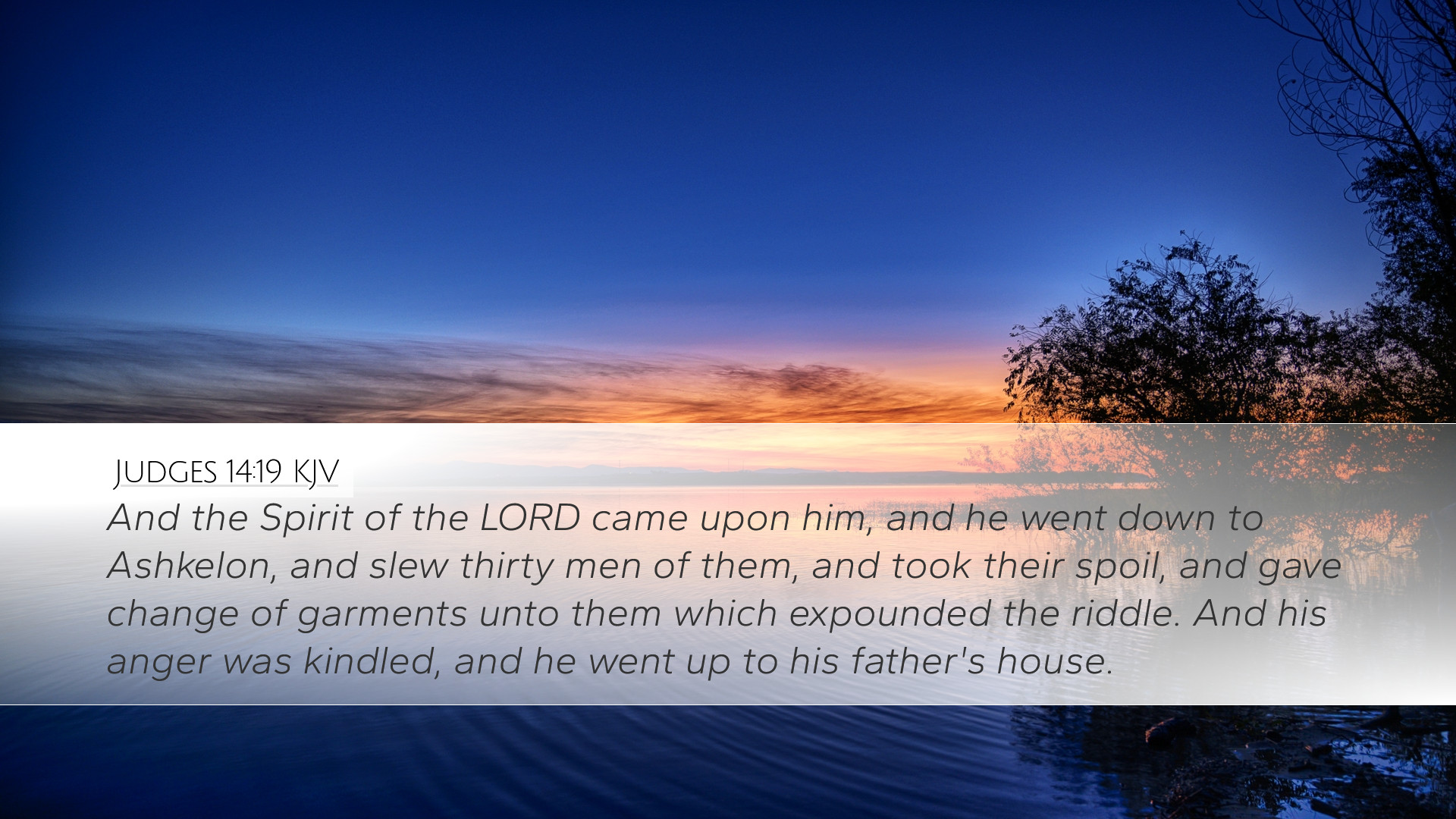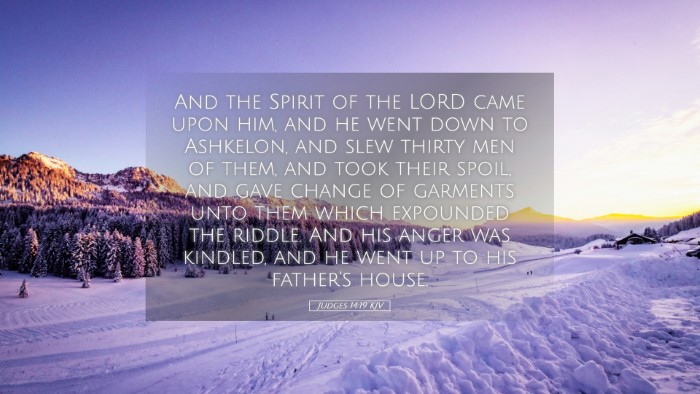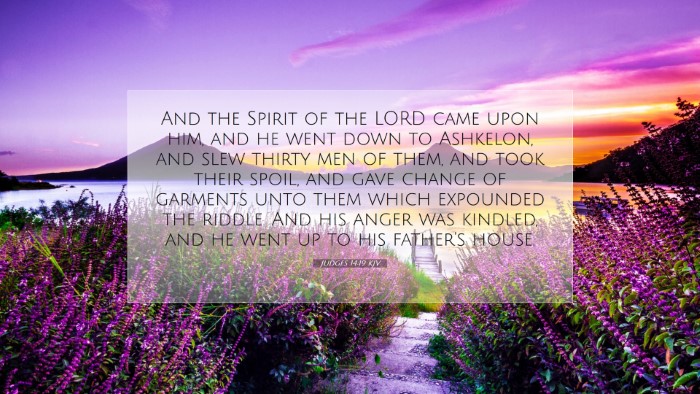Old Testament
Genesis Exodus Leviticus Numbers Deuteronomy Joshua Judges Ruth 1 Samuel 2 Samuel 1 Kings 2 Kings 1 Chronicles 2 Chronicles Ezra Nehemiah Esther Job Psalms Proverbs Ecclesiastes Song of Solomon Isaiah Jeremiah Lamentations Ezekiel Daniel Hosea Joel Amos Obadiah Jonah Micah Nahum Habakkuk Zephaniah Haggai Zechariah MalachiJudges 14:19
Judges 14:19 KJV
And the Spirit of the LORD came upon him, and he went down to Ashkelon, and slew thirty men of them, and took their spoil, and gave change of garments unto them which expounded the riddle. And his anger was kindled, and he went up to his father's house.
Judges 14:19 Bible Commentary
Judges 14:19 Commentary
Verse Text: "And the Spirit of the Lord came upon him, and he went down to Ashkelon and slayed thirty men of them, and took their spoil, and gave change of garments unto them which expounded the riddle."
Introduction
This pivotal verse marks a significant moment in the life of Samson, an enigmatic figure in the Biblical narrative. The text speaks of divine empowerment, conflict, and retribution that reflect deeper theological themes relevant to pastoral ministry, scholarly study, and personal reflection.
Analysis of the Text
The Spirit of the Lord
The phrase "And the Spirit of the Lord came upon him" indicates divine intervention in Samson's life, reminiscent of various biblical figures endowed by the Holy Spirit for specific tasks (e.g., David, Saul). This empowerment, as noted by Clarke, exemplifies God's sovereignty in elevating certain individuals for His purposes.
The Act of Slaying Thirty Men
This act of violence—killing thirty men from Ashkelon—is an abrupt revelation of Samson’s character and the consequences of his impulsive actions. Matthew Henry notes that this violence was not merely an act of personal vendetta but rather a fulfillment of a rash commitment made in a riddle, thus illustrating how personal commitments can lead to broader implications.
Taking Their Spoil
Samson's taking of their spoil reflects a prevailing theme in Scripture of God’s people prevailing over their enemies. Barnes elucidates that this action was a manifestation of both God’s justice and Israel’s deliverance, even through unconventional means.
Change of Garments
Samson’s giving of "change of garments" to those who had solved the riddle serves as a practical demonstration of his fulfillment of a wager. Adam Clarke suggests that this act also has implications of cultural significance in ancient Near Eastern customs, where garments were tokens of victory and honor among peers. It reflects, too, a tangible expression of covenantal loyalty.
Theological Implications
Divine Empowerment and Human Agency
This verse encapsulates the tension between divine empowerment and human agency. While Samson is filled with the Spirit of the Lord, his actions, motivated by personal conflict and impulsiveness, display a complex interplay of divine sovereignty and human choice. Theologians often discuss this balance in the context of free will, illustrating that even those empowered by God can act out of carnal motivations.
God’s Justice and Mercy
The violent act committed by Samson raises questions about the nature of God’s justice. While God empowering Samson to defeat the Philistines is seen as mercy towards Israel, it also demonstrates the harsh reality of sin and its consequences in human relationships. Therefore, pastors should unpack this verse to show how God employs flawed individuals to fulfill His redemptive plan, a theme echoed throughout Scripture.
The Complexity of Samson’s Character
Samson is often regarded as a tragic hero in biblical literature. His great strength and divine calling are consistently juxtaposed against his moral failings and impulsive behaviors. Scholars suggest that studying Samson's character provides crucial insights into human nature, particularly the struggle between spiritual calling and earthly desires, relevant to both theological discourse and personal reflection.
Concluding Thoughts
Judges 14:19 serves as a rich text for understanding divine empowerment, human flaws, and the complexities of God’s redemptive plan. This verse invites pastors, theological students, and scholars alike to explore the interconnectedness of God’s providence with human responsibility, illustrating that even in our failings, God can work for His glory and the benefit of His people.
Practical Applications
- For Pastors: This verse can be utilized in sermons that highlight divine purpose in flawed circumstances, emphasizing God’s grace.
- For Students: It encourages deeper examination of narrative context and character study within the Old Testament.
- For Theologians: This text serves as a case study in discussing human agency in relation to divine sovereignty.
- For All Believers: It reminds individuals of God's ability to use each person for a larger purpose, despite personal shortcomings.


